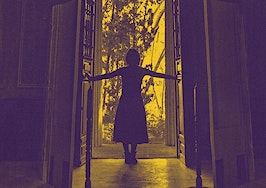Selling new development is, in many ways, akin to putting on an elaborate dance performance.
That is what Corcoran Sunshine agent Crista Villella, who transitioned into real estate after a career in ballet, says of her new role selling units at the boutique Lightstone building in New York’s 40 East End Avenue. Villella was a ballet mistress for Miami City Ballet and a repetiteur (someone who schedules performances and coaches dancers) for Twyla Tharp, and she likens working out of a showroom and selling not-yet-constructed homes to dance in that agents often have to entrance buyers and paint a picture of a particular lifestyle.

Crista Villella
“One of the things that really drew me in is that, unlike resale where you have an actual apartment to show, you really have to paint the picture of what the lifestyle is going to be and what makes it so unique,” adds Danika Dorsey, who was auditioning for the Rockettes and Broadway shows before an injury put an end to her dance career. She’s now the senior sales director at Corcoran Sunshine representing Lightstone’s 130 William. “You are commanding an audience, you’re controlling the flow of information and you’re controlling that experience.”
We sat down to talk about dancing, selling new developments and the connection between the two with Villella and Dorsey.
Inman News: Tells us a bit about your backgrounds and transitions to real estate.
Crista Villella: My dad [Edward Villella] was the founding artistic director of the Miami City Ballet and my mom started the Miami City Ballet School, where I trained. I was immersed in ballet every weekend.
I was the little girl who was always backstage with a bunch of ballerinas. I would watch them perform and they would teach me things. It was very much my world. Every little girl wants to be a ballerina but when you’re in it all the time, it’s even more powerful.
I was a Ballet Mistress at the Miami City Ballet for eight years. We did about 30 productions a year, and I taught all that choreography to the dancers, scheduling it and making sure the vision said what needed to be said. I was also a repetiteur for Twyla Tharp, who sent me around to different companies to do stage work.

Danika Dorsey
To segue into real estate, I resigned with my dad after he left the ballet. I felt young enough to transition careers. The gig life, which I did for a little while in the art world, felt unstable. I was looking for a little more security and I found real estate. What I liked about it was that, at least in new development, it is very similar to actually putting on a production.
Danika Dorsey: I danced from the time that I could walk until I was in my early 20s. I was auditioning in the city, for the Rockettes and for Broadway shows, when I was pretty seriously injured [with torn muscles in my left hip].
I didn’t have the same flourishing career that Crista did, unfortunately, but new development did become my way to remain artistic. I’ve been in real estate for 20 years now and I’ve been selling new development for more than 16 of those years.
One of the things that really drew me in is that, unlike resale where you have an actual apartment to show, you really have to paint the picture of what the lifestyle is going to be and what makes it so unique. You are commanding an audience, you’re controlling the flow of information and you’re controlling that experience.
It really feels sort of like a performance.

Crista Villella with the cast of a Twyla Tharp production after a show.
How can agents use theatrics to capture a buyer and sell them something that they can’t yet see?
DD: I think of selling new development as making fast friends. You meet your customer, you assess their interests, their personality and what makes them smile.
It’s really about reading the audience and responding and keeping them really engaged. As I go through my presentation, I will alter how I convey information, tell a joke in a certain place or focus on certain things that seem to be meaningful to a particular buyer.
CV: At the end of the day, we are putting on a show. That’s why they call it a showing. I may have traded in my pointe shoes for my high heels but the goal has always been to be real and authentic. If I gain [the buyers’] trust, they start communicating and open up to me.
The big difference is that audiences sit in a hall and typically do not interact with the performers. Agents, on the other hand, are constantly communicating with their clients.
CV: I was in a unique position because my dad gave me performance talks before every performance and when he couldn’t do it, I did it. I would get on stage with a mic and give insight into what [the audience] was about to see and try to give a deeper meaning to the performance. Now, I also give a pre-performance talk before my tour to give buyers further insight into the building.
DD: Keep in mind that we’re with a buyer or a group of buyers for 45 minutes to an hour just talking about this one building. A typical resale agent opens the door, shows the listing and speaks to the buyer for about 20 minutes before the buyer is out the door and seeing the next thing.
So that relationship that Crista was talking about, of authenticity and trust, becomes really important because we’re talking about what makes an entire building unique and special. It’s just a different type of presentation that is more in-depth than virtually any other type of real estate.
Real estate is generally not thought of a creative field; people tend to see it as working with what you’re given. Would you challenge that?
DD: Our marketing processes is very creative. We have a marketing team but all salespeople people are always involved in trying to come up with unique and creative ways to launch the next stage of a building or a marketing initiative that will be really impactful for brokers and buyers.
There’s a really nice creative element there too that I think makes development fun.

Danika Dorsey (far right) as a young dancer.
Do you consider selling real estate similar to acting and putting on a show?
DD: I think we’re engaging. Acting makes it seem like we’re pretending when it’s not that as much as being creative in the way we convey the best aspects of our project and what is really true about a project in order to differentiate ourselves within the market.
Keep in mind that a lot of the time people are coming to us when there is not a physical building. Many times people are coming to an off-site sales gallery, they’re seeing a model apartment that isn’t in the actual space. We’re asking our buyers to instill a very high level of trust in us.
CV: Artists often need to be so real that it’s almost like they’re not acting. I think there are some salespeople who are really kind phony, but the artists in us want to be as real as possible.
You are putting on a show in the sense that you’re dressing up, you’re putting your best foot forward and you are becoming an expert [in the product you’re selling] and preparing not in order to trick anyone but rather to give them the best information and experience that you can.









